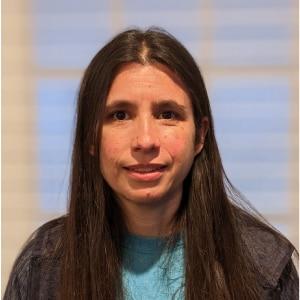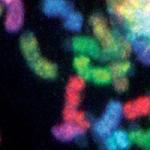
Florencia Maeva Pratto, Ph.D.
Stadtman Investigator
Section on Replication and Recombination in the Mammalian Germline, Genetics & Biochemistry Branch
NIDDK
Research Topics
Gametes, such as sperm and eggs, are produced through meiosis. In this specialized type of cell division, a single round of DNA replication is followed by two successive rounds of chromosome segregation. In the first division, homologs (each parental chromosome) separate; in the second division, the sister chromatids segregate, resulting in four haploid daughter cells. The segregation of homologs poses a unique challenge because they must be physically connected for accurate segregation. The connection between homologs, in most mammals, is mediated by the deliberate introduction of hundreds of double-stranded breaks (DSBs) and their subsequent repair through homologous recombination. The cell needs to fine-tune the timing and placement of DSBs to avoid deleterious events, such as mutations or aneuploidies. 20% to 60% of human oocytes have a karyotypic defect, and errors in meiosis are responsible for at least half of clinically recognized miscarriages, as well as a spectrum of chromosomal birth defects in humans, such as Down syndrome.
The main focus of our research is to understand the multiple layers that shape the recombination landscape over size scales ranging from single nucleotides to whole chromosomes in the human and mouse germlines. To achieve this goal we use a combination of genetics, multi-omics analysis and microscopy. Successful meiosis requires the coordination of multiple cellular and molecular processes. Through this research program, I seek to advance our knowledge of a critical biological process at the core of modern genetics that profoundly affects human reproductive health and disease.
Biography
- Staff Scientist, NIDDK, NIH, 2016-2024
- Postdoctoral Fellow, NIDDK, NIH, 2007-2016
- Ph.D., Universidad Autonoma de Madrid, 2007
- B.S., Universidad de Buenos Aires, 2000
Selected Publications
- Pratto F, Brick K, Cheng G, Lam KG, Cloutier JM, Dahiya D, Wellard SR, Jordan PW, Camerini-Otero RD. Meiotic recombination mirrors patterns of germline replication in mice and humans. Cell. 2021;184(16):4251-4267.e20.
- Pratto F, Brick K, Khil P, Smagulova F, Petukhova GV, Camerini-Otero RD. DNA recombination. Recombination initiation maps of individual human genomes. Science. 2014;346(6211):1256442.
- Lam KG, Brick K, Cheng G, Pratto F, Camerini-Otero RD. Cell-type-specific genomics reveals histone modification dynamics in mammalian meiosis. Nat Commun. 2019;10(1):3821.
- Brick K, Pratto F, Sun CY, Camerini-Otero RD, Petukhova G. Analysis of Meiotic Double-Strand Break Initiation in Mammals. Methods Enzymol. 2018;601:391-418.
- Brick K, Thibault-Sennett S, Smagulova F, Lam KG, Pu Y, Pratto F, Camerini-Otero RD, Petukhova GV. Extensive sex differences at the initiation of genetic recombination. Nature. 2018;561(7723):338-342.
Related Scientific Focus Areas



Molecular Biology and Biochemistry
View additional Principal Investigators in Molecular Biology and Biochemistry
This page was last updated on Friday, August 29, 2025